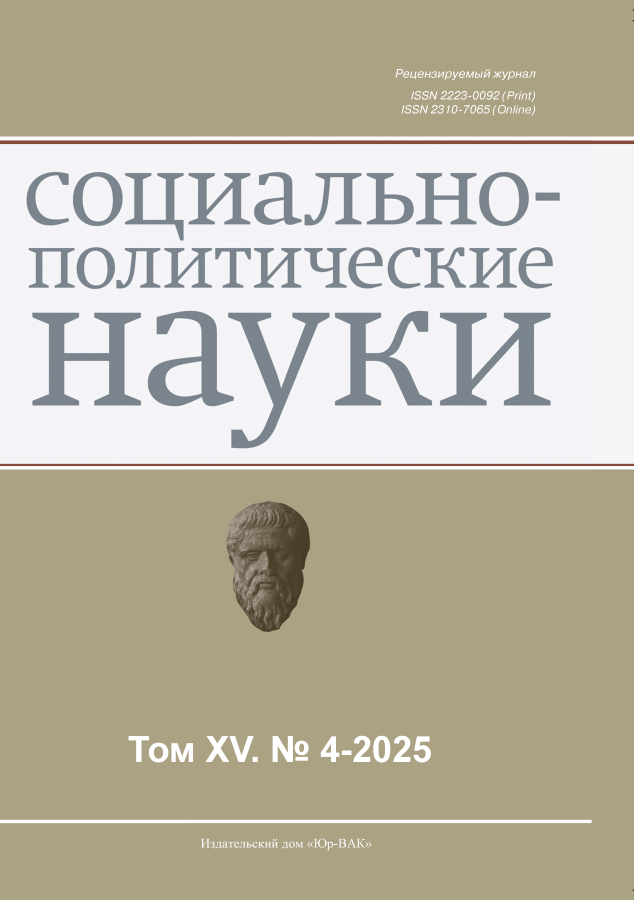Memory policy as a component of the state strategy for protecting traditional values
- Authors: Gryadunov Y.Y.1, Tsybakov D.L.2
-
Affiliations:
- Central Russian Institute of Management – branch of the Russian Academy of National Economy and Public Administration under the President of the Russian Federation
- Moscow State Linguistic University
- Issue: Vol 15, No 4 (2025)
- Pages: 155-164
- Section: Public Administration and Sectoral Policies
- URL: https://journal-vniispk.ru/2223-0092/article/view/348444
- DOI: https://doi.org/10.33693/2223-0092-2025-15-4-155-164
- EDN: https://elibrary.ru/YBVBBT
- ID: 348444
Cite item
Abstract
The purpose of the research. This article examines the transformation of state memory policy in contemporary Russia in the context of information confrontation and the protection of traditional spiritual and moral values. It analyzes the role of memory policy as an independent factor in shaping national identity and as a tool to counteract the falsification of historical narratives. Special attention is given to the symbolic potential of the Great Patriotic War in Russian memory policy, including an analysis of the effectiveness of commemorative practices such as the St. George Ribbon, Victory Day, and the “Immortal Regiment” campaign. The article considers the multi-level system of memory policy actors, including state institutions, mass media, educational establishments, and civil society institutions. Results. Contemporary challenges related to the use of digital technologies and social networks for spreading destructive historical interpretations are identified. Regional features of historical memory formation and problems of overcoming “divided memories” in a multiethnic society are also explored. The role of museum institutions and educational practices in transmitting historical knowledge to younger generations is analyzed. The necessity of creating a comprehensive system to counter information threats in the field of historical memory, including the establishment of the Russian Institute of National Memory, is justified. The conclusion highlights the strategic importance of memory policy in ensuring cultural security and intergenerational continuity in Russia’s multiethnic society.
Full Text
##article.viewOnOriginalSite##About the authors
Yuriy Y. Gryadunov
Central Russian Institute of Management – branch of the Russian Academy of National Economy and Public Administration under the President of the Russian Federation
Author for correspondence.
Email: y.gryadunov@gmail.com
ORCID iD: 0009-0009-5203-9330
SPIN-code: 8842-0270
postgraduate student
Russian Federation, OrelDmitriy L. Tsybakov
Moscow State Linguistic University
Email: d413839@yandex.ru
ORCID iD: 0000-0001-8240-6415
SPIN-code: 9221-5863
Dr. Sci. (Polit.), Professor, Department of Political Science
Russian Federation, MoscowReferences
- Achkasov V.A. “Politics of Memory” as a tool for building post-socialist nations. Journal of Sociology and Social Anthropology. 2013. No. 4. Pp. 106–123. (In Rus.)
- Artamonov D.S., Tikhonova S.V. History and historical memory of the Great Patriotic War in the communication practices of the digital society. Russian School of Public Relations. 2020. No. 17. Pp. 29–43. (In Rus.). EDN: RYZKLW.
- Ioffe A.E. Immortal regiment. Heritage of the Centuries. 2016. No. 2 (6). Pp. 88–89. (In Rus.). EDN: YNWJRT.
- Israfilova Z.A. The role of commemorative practices in the process of functioning and development of historical memory. Historical, Philosophical, Political and Legal Sciences, Cultural Studies and Art Criticism. Theory and Practice Issues. 2016. No. 2 (64). Pp. 70–73. (In Rus.). EDN: VJFOJL.
- Kuritsyn A.N., Lemer L.G., Ashmanov I.S., Grebenyuk A.A. The Great Patriotic War. Falsification of history. Manipulations in social media. Moscow: First Economic Publishing House, 2020. 52 p. doi: 10.18334/9785912923296.
- Logunova L.Yu., Rychkov V.A. Field of memory: Construction and struggle of narratives. Ideas and Ideals. 2020. Vol. 12. No. 4-1. Pp. 191–213. (In Rus.). doi: 10.17212/2075-0862-2020-12.4.1-191-213. EDN: JBESBY.
- Malinova O.Yu. Politics of memory as a field of symbolic politics. Method. 2019. No. 9. Pp. 285–312. (In Rus.). EDN: EROTGR.
- Myslivets N.L., Romanov O.A. Historical memory as a sociocultural phenomenon: Experience of sociological reconstruction. Bulletin of the Peoples’ Friendship University of Russia. Series: Sociology. 2018. Vol. 18. No. 1. Pp. 9–19. (In Rus.). doi: 10.22363/2313-2272-2018-18-1-9-19. EDN: YNUEIQ.
- Prasolov D. Commemorative practices in modern Kabardino-Balkaria. Neprikosnovenny zapas. 2017. No. 2. Pp. 67–82. (In Rus.)
- Rusakova O.F. Discourse of state memory policy as a factor in the formation of national identity of modern Russia. Discourse-Pi. 2023. Vol. 20. No. 2. Pp. 32–51. (In Rus.). doi: 10.17506/18179568_2023_20_2_32. EDN: JHQEMR.
- Semenenko I.S. New perspectives of identity politics: Difficult memory in twentieth-century history museums. World Economy and International Relations. 2020. Vol. 64. No. 5. Pp. 16–32. (In Rus.). doi: 10.20542/0131-2227-2020-64-5-16-32.
- Timshina E.L. Shadow of personality. The image of I.V. Stalin in modern party discourse. Historical Journal: Scientific Research. 2021. No. 5. Pp. 16–32. (In Rus.). doi: 10.7256/2454-0609.2021.5.36490.
- Titov V.V. On the issue of directions of modernization of state memory policy in Russia. Society: Politics, Economics, Law. 2022. No. 8 (109). Pp. 23–27. (In Rus.). doi: 10.24158/pep.2022.8.3. EDN: AXKSSO.
Supplementary files








